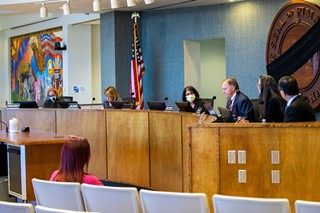The Pima County Board of Supervisors delayed revising new regulations added to the county health code to help prevent a COVID-19 outbreak as the state reopens for business during the pandemic.
The Board of Supervisors will meet again on Thursday, May 21, to finalize an easing of the new restrictions.
The move to change the regulations came after complaints from restaurant owners and an investigation by Arizona Attorney General Mark Brnovich, who was asked to look into the situation by three state lawmakers.
The new regulations were first created during an emergency meeting last Wednesday, May 13. The Board of Supervisors voted 3-2 to proclaim 15 of the 17 new guidelines recommended by the county's Back to Business Bars and Restaurants Task Force as temporary regulations to the county health code. Supervisors Steve Christy and Ally Miller voted against the proclamation.
State Sen. Vince Leach and state Reps. Mark Finchem and Bret Roberts filed a complaint with Arizona Attorney General Mark Brnovich's office on May 15 calling for an investigation into Pima County's actions. The state lawmakers say the county's proclamation attempts to supersede Gov. Ducey's May 12 executive order allowing dine-in service at Arizona restaurants as long as they follow the state's recommended guidelines.
"We've seen throughout this crisis how important it is to balance health concerns with the need to reopen businesses and get Arizonans back to work," Leach said in a prepared statement. "Gov. Ducey and the Legislature have been working with experts to find that balance and determine the best course of action for the entire state. It is unfortunate that Pima County is taking actions that are not consistent with the state. The cumbersome regulations in its proclamation will not facilitate an easy reopening for businesses."
The lawmakers filed the complaint with Brnovich under a 2016 law that prevents local jurisdictions from taking actions that conflict with state law. Under the law, jurisdictions face a loss of a portion of their state-shared revenues until they repeal the contested regulations.
Finchem said while he doesn't agree with Gov. Ducey's emergency regulations because they are too restrictive to business, he thinks it was "inappropriate" for Pima County to take additional action.
"A plain reading of the governor's order in comparison to what Pima County has done gave us sufficient cause to believe the county had exceeded what the governor had approved," Rep. Fenchem said. "Now that we've turned over our findings to the Attorney General's Office, we really shouldn't be commenting on it any more than that."
Board of Supervisors Chairman Ramon Valadez said the county's proclamation was drafted "to be in compliance" with the governor's order. Valadez personally sent the proclamation to Gov. Ducey before the county's emergency meeting took place, he said.
"When we drafted the proclamation and the conditions, we gave specific orders to our attorney that those conditions had to be in compliance and not conflict with the governor's orders," Valadez said. "I sent a letter with the 17 considerations and the proclamation to Gov. Ducey to make sure he was aware of what it is we're doing. That doesn't mean he is aware of it at this point or not, but we sent the letter the day before we considered it."
Valadez said the three state lawmakers are "playing political games" during the pandemic while the county is trying to "save lives."
"Why did we do these conditions? It's about saving lives. Why did they make this claim? To play political games," Valadez said. "They're playing political games with people's lives and I don't think that's a game we should be playing."
Members of the county's Back to Business Bars and Restaurants Task Force said that while they helped create guidelines and best practices, they didn't think their recommendations would become regulations with fines attached.
"We offered to help be a part of this from the very beginning and now we're the ones being targeted with fines," said Ray Flores, owner of El Charro and its related restaurants. "If it's really about public health and human safety, then all businesses should have to go through this. This is not a restaurant problem, this is a human population problem."
The task force, which was composed of eight restaurant and bar owners as well as five county health department staff members, was organized late April with the job of crafting guidelines and best practices for bars and restaurants in the county. Among the recommendations: wellness and symptom checks; cloth masks and gloves to be worn by all staff; patrons exhibiting signs of COVID-19 are not permitted on premises; and no more than 10 diners allowed per table, as well as no bar-top seating.
Flores said not only was it disappointing to see such a highly regulated industry such as food service now being threatened with fines, but restaurateurs were being expected to act as pseudo-healthcare workers with no training and very little guidance on how to proceed.
"Nobody in the restaurant business wants to make anyone sick," Flores said. "At the same time, nobody in the restaurant business is a healthcare professional."
Pima County Environmental Health Supervisor Gary Frucci said the county health department is still figuring out how exactly to enforce the new regulations, which could carry a $500 fine after the third violation. Frucci said the health department's goal is to educate restaurants on how to be in compliance, not to issue fines.
"We don't expect (issuing fines) to be an issue for a variety of reasons. One of which is most facilities appear to be in compliance," Frucci said. "On average, most food facilities this applies to would be inspected every four to six months."










